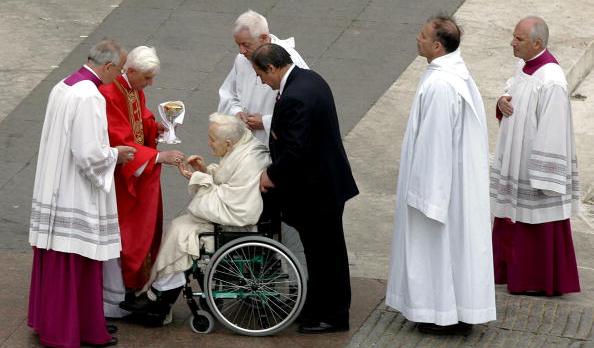This morning, Aleteia’s Diane Montagna has some insight from two leading cardinals, responding to suggestions that Catholics and Lutherans might be able to share communion under some circumstances.
Among other things, Cardinal Robert Sarah explains:
“Intercommunion is not permitted between Catholics and non-Catholics. You must confess the Catholic Faith. A non-Catholic cannot receive Communion. That is very, very clear. It’s not a matter of following your conscience.” “Sometimes, an Anglican who is very far away from his church for a very long period of time and who desires to receive Communion, can participate in Mass and receive Communion in the Catholic Church, where there is no sin, and he is properly married. Because they believe in the Eucharist, even if in the Anglican church is it not actually the Eucharist because there is no priesthood. But it is rare and would happen under very exceptional circumstances. This is something extraordinary and not ordinary.”
Canon law, however, is somewhat more detailed and nuanced:
- Whenever necessity requires it or true spiritual advantage suggests it, and provided that danger of error or of indifferentism is avoided, the Christian faithful for whom it is physically or morally impossible to approach a Catholic minister are permitted to receive the sacraments of penance, Eucharist, and anointing of the sick from non-Catholic ministers in whose Churches these sacraments are valid.
- Catholic ministers administer the sacraments of penance, Eucharist, and anointing of the sick licitly to members of Eastern Churches which do not have full communion with the Catholic Church if they seek such on their own accord and are properly disposed. This is also valid for members of other Churches which in the judgment of the Apostolic See are in the same condition in regard to thesacraments as these Eastern Churches.
- If the danger of death is present or if, in the judgment of the diocesan bishop or conference of bishops, some other grave necessity urges it, Catholic ministers administer these same sacraments licitly also to other Christians not having full communion with the Catholic Church, who cannot approach a minister of their own community and who seek such on their own accord, provided that they manifest Catholic faith in respect to these sacraments and are properly disposed.
Read more on the subject here.
There have been several well-publicized incidents of non-Catholics receiving communion at Mass—most notably, British Prime Minister Tony Blair, who was an Anglican at the time (but married to a Catholic) and reportedly received from Pope John Paul II. Also, (as shown above) Brother Roger, the Protestant founder of Taizé, received from then-Cardinal Ratzinger at John Paul’s funeral.
Photo: Getty Images

